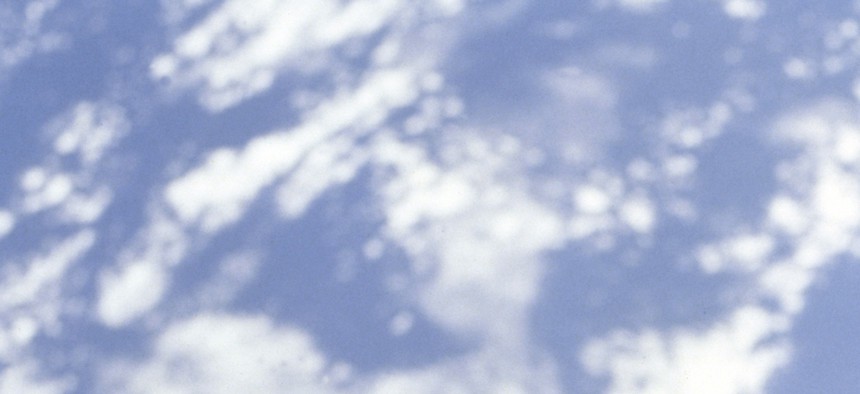NASA Tries to Cash In on Russia Tensions

NASA
The space agency isn't letting the Crimean crisis go to waste.
NASA is trying to turn U.S. tensions with Russia into a proxy war with Congress over the agency's budget.
Last week, NASA announced it was cutting off most communication with Russia's Roscosmos agency because of President Vladimir Putin's incursion into Crimea. But after a cursory mention of the crisis in Ukraine, the space agency spent nearly a dozen lines blaming Congress for NASA's inability to put its own astronauts into orbit.
"NASA is laser-focused on a plan to return human spaceflight launches to American soil, and end our reliance on Russia to get into space," the release said. "This has been a top priority of the Obama administration's for the past five years, and, had our plan been fully funded, we would have returned American human spaceflight launches ... back to the United States next year."
On Tuesday, NASA Administrator Charles Bolden told the House Appropriations Committee that securing some $850 million for commercial spaceflight partnerships is his "No. 1 objective" for the upcoming budget. And last month, he told another House panel: "The choice here is between fully funding the request to bring space launches back to American soil or continuing to send millions to the Russians. It's that simple. The Obama administration chooses to invest in America—and we are hopeful that Congress will do the same."
The United States has lacked the ability to launch its own astronauts since the space-shuttle program shut down in 2011. Currently, NASA pays Russia about $70 million for each astronaut it ferries to the International Space Station.
Despite NASA's announcement, that agreement will continue for at least three more years, as the agency tries to get commercial partners in the U.S. ready to take on the space-taxi role. The original goal was to launch astronauts from the U.S. by 2015, but Bolden blamed budget cuts for pushing back that timeline. Future cuts, he warned, could add years of additional delays. The latest contract is expected to award Russia nearly half a billion dollars to launch six astronauts in 2016 and 2017.
While NASA asserts that underfunding has left it vulnerable to Moscow's whims, some experts say the agency's rhetoric overstates Russia's ability to harm the U.S. space program—and that the argument will fail to loosen congressional purse strings.
The issue, experts say, is that Russia can't punish NASA without crippling its own space program. For that same reason, they say, NASA's cessation of communications with Roscosmos isn't a serious sanction.
Jim Oberg, a former NASA official who studied Russian space programs for the agency, says it's misguided to suggest the U.S. is at Russia's mercy until NASA can launch its own astronauts. Russia's lagging industry, he says, relies on spacecraft components from overseas.
Bolden, NASA's chief, admitted as much Tuesday when pressed on what NASA plans to do if the relationship with Russia breaks down completely. The plan, he said, is to make sure it doesn't. He expressed confidence that Russia knows that its space industry is too intertwined with ours to do anything drastic. "If they want to continue to operate in low-Earth orbit, they've got to stay in the partnership," he said. "They know that as much as we do."
Underscoring the gap between rhetoric and reality, the earthbound war of words between NASA and Roscosmos—and the decision to cut off some areas of communication—has done exactly nothing to change the two countries' joint operations at the International Space Station.
Regardless of the Russian reality, Republicans don't share NASA's sense of budgetary urgency. Rep. Frank Wolf, who chairs the House Appropriations Commerce, Justice, Science, and Related Agencies Subcommittee, told Bolden in a heated exchange Tuesday that spaceflight funding has been more than adequate. "We have protected this program," he said, citing other instances where NASA has overrun its budget.
"Our numbers don't jibe," Bolden responded. "Congress has provided about $2 billion for commercial crew. We have requested $3 billion over that period of time."
Those House Republicans who agreed that the situation in Russia could present a threat to NASA blamed the administration's sanctions—saying they could lead the Russians to retaliate—rather than their own budget decisions.
Bolden's budget request is not without congressional supporters, including Sen. Bill Nelson, a Florida Democrat who is a former astronaut and a strong NASA ally. "This is why the development of American commercial spaceflight is so vital," he said. "We've got to properly fund and support commercial spaceflight so we can keep our space program alive and well, no matter what happens with Russia."
This article appears in the April 12, 2014 edition of National Journal Magazine as NASA's Russia Gambit.





